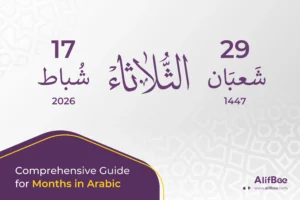5 Inspiring Arabic Proverbs on Good Morals and Ethics
Welcome to another blog in this series focusing on useful Arabic proverbs that our dear Arabic language learners can learn from and use in everyday conversations.
As we know, Islam teaches numerous noble principles and encourages Muslims to adhere to good morals. These morals are based on the Quran and Hadith and are reflected in many famous sayings and quotes.
Today, we’ll explore five powerful Arabic proverbs on good morals and ethics. These will enrich your Arabic language and help guide you on your life’s journey with the valuable lessons they offer.
If you want to be obeyed, ask for what is possible
In aradta an tuṭāʻa fāṭlubi almustaṭāʻa
إِن أرَدْتَ أَنْ تُطاعَ فاطْلُبِ المُسْتَطاعَ
This Arabic proverb offers timeless wisdom. It reminds us to be realistic and reasonable in our expectations of others. Simply, we are more likely to gain the cooperation and respect of those around us when we ask for achievable goals.
If you feel no shame, then do as you wish
Idhā lm tastḥi fāṣnʻ mā shiʼt
إذا لمْ تَسْتحِ فاصْنعْ ما شِئْت
This proverb is a Prophetic saying (Hadith) from the words of Prophet Muhammad (peace be upon him). It is recorded in Sahih al-Bukhari and other collections of Hadith, and its full text is:
“Among the sayings of the early Prophets that people have reached is: If you do not feel shame, then do as you wish.”
The Hadith emphasizes the importance of modesty (haya’) (or feeling shame) as a moral value. Modesty prevents individuals from committing sins or engaging in inappropriate actions. If someone lacks modesty or a sense of shame, they may feel unrestrained and capable of doing anything, regardless of ethics or morality.
This Hadith serves as a warning against losing the quality of modesty. It reminds us that a person without modesty might behave in ways that are contrary to religious and moral principles
Whoever guides someone to goodness will have a reward like the one who does it.
Alddālu ʻalá alkhayri kfāʻilih
الدّالُ على الخَيْرِ كفاعِلِه
This saying encourages us to promote goodness and inspire others to do the same, emphasizing the ripple effect that our actions can have on the world around us. Its origin is the prophetic saying
من دلَّ على خير، فله أجر فاعله
Man dalaa ʻalá Khayr, falahu ajru fāʻilh
This is a Prophetic saying (Hadith) of Prophet Muhammad (peace be upon him) and is recorded in the collections of Hadith, including Sahih Muslim. This Hadith means that anyone who directs or guides others toward good deeds—whether by giving advice, pointing them to an act of righteousness, or helping them achieve a beneficial goal—will receive the same reward as the person who performs the good deed.
It highlights the importance of spreading good and encouraging others to perform righteous acts
Forbearance is the master of all morals
Alḥilmu sayydu alʼakhlāqi
الحِلْم سيّدُ الأخلاقِ
This is a well-known Arab proverb that emphasizes wisdom and virtue. It is found in various contexts within Arabic literature and writings on ethics and wisdom.
“Forbearance” (ḥilm) refers to self-restraint, patience, and the ability to act wisely and calmly in the face of anger or provocation. The saying highlights that forbearance is the most noble and superior of all virtues, as it allows a person to handle difficult situations with dignity and without rashness.
Be generous to a generous person and you'd win him, be generous to a mean person and he'd rebel against you
Idhā akramta alkryma mlaktahu wa-idhā akrmta alllʼyma tamarrdā
إذا أكْرَمْتَ الكريمَ ملَكْتَهُ وإذا أَكْرمْتَ اللّئيمَ تَمَرّدا
This is a verse that is attributed to Imam Al-Shafi’i, one of the greatest scholars of Islam. It serves as a reminder that our kindness and generosity may not always be reciprocated in the same manner. It teaches us to be discerning in our interactions and to understand that not everyone may appreciate or return our good intentions.
These five Arabic proverbs have origins in Islam and Arabic Culture and offer valuable lessons on good morals, ethics, and personal growth. Don’t forget to practice them regularly and check other similar blogs about more Arabic proverbs.
You can also read:
9 Timeless Arabic Proverbs about Wisdom








